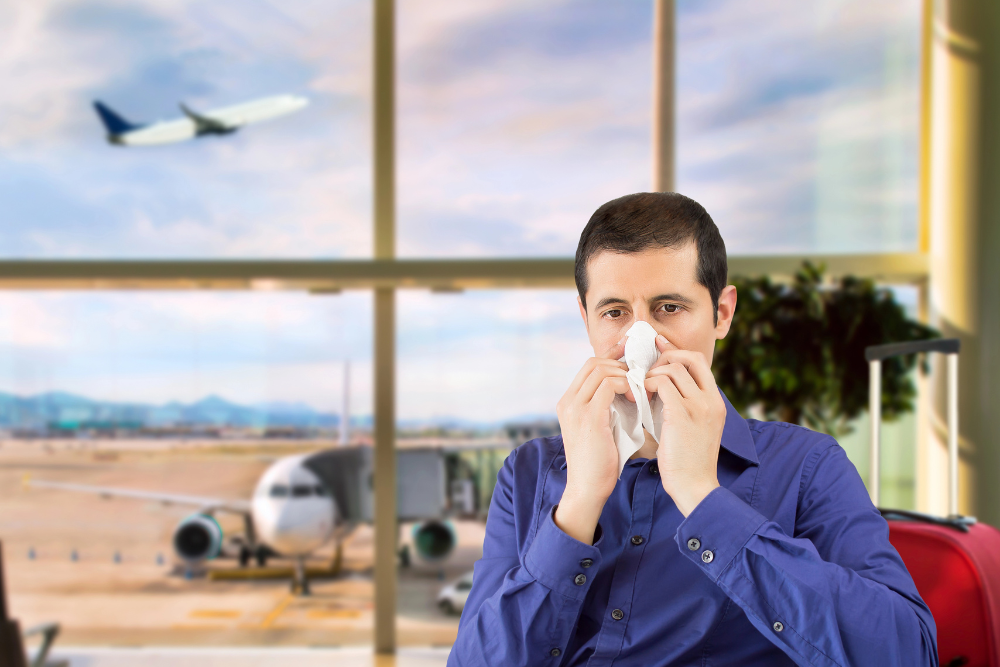Traveling is an exciting adventure, but sinus and ear problems can put a damper on your trip. The good news is that with a little planning and preparation, you can manage these issues and have a smooth, enjoyable journey. This article will provide practical tips to help you prevent discomfort and ensure your ears and sinuses cooperate throughout your travels, and help you determine when to see an ENT doctor in Glendale.
Ignoring sinus and ear problems while traveling can be risky. Unmanaged symptoms can range from mild discomfort to severe pain, affecting your ability to enjoy your trip and potentially leading to complications. Here’s why it’s important to address these issues proactively:
- Pain and Discomfort: Sinus and ear problems can cause significant pain and discomfort, making it difficult to sleep, concentrate, or participate in activities.
- Balance Issues: Ear problems can affect your balance, which can be dangerous, especially when navigating unfamiliar surroundings.
- Worsening of Symptoms: Ignoring sinus or ear issues can lead to worsening symptoms, potentially requiring medical attention during your travels.
- Risk of Infection: Pressure changes during flights can increase your risk of developing ear infections, especially if you have a cold or allergies.
Understanding how travel affects your ears and sinuses is key to managing symptoms.
- Air Pressure Changes: During takeoff and landing, rapid changes in air pressure can cause congestion and discomfort in your sinuses and ears. This is because the Eustachian tubes, which regulate pressure in your middle ear, can have difficulty adjusting quickly.
- Dry Air: Airplane cabins have notoriously dry air, which can irritate nasal passages and sinuses, leading to congestion and dryness.
- Altitude: Traveling to high altitudes can also affect your sinuses and ears due to decreased air pressure.
Understanding Sinus and Ear Problems
Causes of Sinus Issues
Several factors can contribute to sinus problems while traveling, including:
- Infections: Sinus infections can cause congestion, facial pain, and pressure.
- Allergies: Exposure to allergens like dust, pollen, or pet dander on airplanes or in new environments can trigger allergies and worsen sinus symptoms.
- Colds: The common cold can cause congestion, runny nose, and postnasal drip, which can irritate the sinuses.
- Sinusitis: Chronic sinusitis can make you more susceptible to problems during travel due to underlying inflammation.
Ear Barotrauma (Airplane Ear)
Ear barotrauma, also known as airplane ear, is a common condition caused by pressure imbalance in the middle ear. It occurs when the Eustachian tubes have difficulty equalizing pressure during ascent and descent. Symptoms of airplane ear can include:
- Ear pain
- Muffled hearing
- Popping or clicking sensations in the ear
Also Read: Sinus Infection or Pneumonia? Critical Warning Signs You Can’t Ignore!
Pre-Travel Preparation
A little preparation goes a long way in preventing sinus and ear problems while traveling. Here are some key steps to take before your trip:
Consult an ENT Doctor in Glendale
Schedule a checkup: If you have chronic sinusitis, allergies, or frequent ear infections, consult your ENT doctor in Glendale before traveling. They can assess your condition and provide personalized advice.
- Discuss medications: Depending on your situation, your doctor may recommend decongestants, antihistamines, or nasal sprays to prevent or manage symptoms during travel. Be sure to mention your destination and inquire about medications that may be appropriate for the climate or allergens you might encounter.
Pack Essential Supplies
- Saline nasal spray: This helps moisten nasal passages and thin mucus, reducing congestion.
- Decongestants (oral or nasal): These can help relieve congestion and open up your sinuses.
- Earplugs or filtered earplugs (like EarPlanes): Earplugs can help regulate ear pressure during flights. Look for filtered earplugs designed to allow air to pass through while reducing noise.
- Chewing gum, lozenges, or candy: Sucking or chewing can help stimulate saliva production and swallowing, which can help equalize ear pressure.
Medications for allergies (antihistamines): If you have allergies, pack antihistamines to help manage symptoms during your trip.
Stay Hydrated
- Drink plenty of fluids: Staying hydrated is important for preventing mucus buildup and keeping nasal passages moist. Drink plenty of water, especially during travel, to avoid dehydration.
During Travel: Airplane Tips
Take Preventive Measures
- Use nasal spray or decongestants: Apply nasal spray or take oral decongestants about 30 minutes before takeoff and landing to help open up your sinuses.
- Avoid flying if possible: If you have an active cold, a severe sinus infection, or severe ear pain, consider postponing your flight if possible.
Relieve Pressure Changes
- Yawning, swallowing, and chewing gum: These actions can help stimulate swallowing and equalize pressure in your ears.
- Perform the Valsalva maneuver or Toynbee maneuver: These techniques involve gently blowing against closed nostrils or pinching your nose while swallowing to help open the Eustachian tubes.
- Use filtered earplugs: During ascent and descent, use filtered earplugs to help regulate ear pressure.
Stay Comfortable During Flight
- Drink plenty of water: Continue to stay hydrated throughout the flight.
- Avoid caffeine or alcohol: Caffeine and alcohol can dehydrate you and dry out your nasal passages, worsening symptoms.
- Use a travel pillow: A travel pillow can help you rest comfortably and minimize stress, which can contribute to sinus congestion.
Also Read: When Is Surgery Necessary for Sinus Infections?
Managing Symptoms on Other Types of Travel
Car or Bus Travel
- Manage sinus pressure: If traveling by car or bus through hilly or mountainous areas, you may experience changes in air pressure. Use air conditioning to circulate fresh air and help regulate cabin temperature.
Train Travel
- Altitude changes: If traveling by train through mountainous regions, be aware that altitude changes can affect your sinuses and ears.
Cruise Ships
- Humid environments: Humid environments on cruise ships can be beneficial for some sinus sufferers. However, be mindful of potential allergens on board, such as dust mites or mold.
Post-Travel Recovery
Travel, while exciting, can sometimes leave you with lingering effects. Here’s how to navigate potential post-travel discomforts:
Recognize Lingering Symptoms
- Blocked Ears: This is a common issue, especially after air travel due to pressure changes. You might experience a feeling of fullness or muffled hearing.
- Sinus Pain or Congestion: Changes in altitude and exposure to new environments can irritate your sinuses. You might experience pressure, pain, or congestion.
- Dry Eyes: Air travel can dry out the eyes, leading to irritation, redness, and blurred vision.
- Jet Lag: Disruptions to your natural sleep-wake cycle can cause fatigue, insomnia, and difficulty concentrating.
Utilize Home Remedies
- Blocked Ears:
- Yawning and Swallowing: These actions can help equalize pressure in your ears.
- Valsalva Maneuver: Gently try to exhale against a closed nose and closed mouth.
- Sinus Pain/Congestion:
- Steam Inhalation: Inhale steam from a hot shower or a bowl of hot water.
- Warm Compresses: Apply warm, moist compresses to your sinuses.
- Saline Nasal Rinses: Rinse your nasal passages with saline solution to help clear congestion.
- Dry Eyes:
- Artificial Tears: Use over-the-counter lubricating eye drops to relieve dryness.
- Warm Compresses: Apply warm compresses to your closed eyes.
- Jet Lag:
- Adjust Your Sleep Schedule: Gradually adjust your sleep schedule to match your new time zone.
- Light Exposure: Expose yourself to sunlight during the day and minimize light exposure at night.
- Hydration: Stay well-hydrated throughout the day.
When to Seek Medical Care
If symptoms persist or worsen after your trip, consult your ENT doctor in Glendale or an ENT specialist near me, such as those at OC Ear Nose Throat Head & Neck Surgery.
Special Considerations
Traveling with children
Children are more susceptible to ear problems during travel. Be extra vigilant about preventing and managing symptoms in children.
Traveling while sick
If you are experiencing a cold or sinus infection, it’s generally best to avoid air travel if possible. Flying while sick can increase your risk of complications and spread illness to others.
Conclusion
Traveling with sinus and ear problems doesn’t have to be a dreaded experience. By understanding the factors that can affect your symptoms, taking preventive measures, and knowing how to manage discomfort during travel, you can significantly improve your travel experience. Remember to plan ahead, consult with your ENT doctor in Glendale, and prioritize your health throughout your journey.
For more information on managing sinus and ear problems, schedule a consult with us at Orange Coast Ear, Nose, Throat, Head & Neck Surgery!


 Schedule a checkup: If you have chronic sinusitis, allergies, or frequent ear infections, consult your ENT doctor in Glendale before traveling. They can assess your condition and provide personalized advice.
Schedule a checkup: If you have chronic sinusitis, allergies, or frequent ear infections, consult your ENT doctor in Glendale before traveling. They can assess your condition and provide personalized advice.